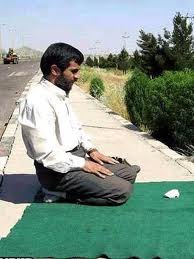 A notable example of how politics in Iran can be misread, even by observers inside the country....
A notable example of how politics in Iran can be misread, even by observers inside the country....
Jason Rezaian, the Tehran correspondent of The Washington Post, proclaims, "Ahmadinejad Proves Resilient in Iran", a claim which might prove surprising to those who have closely followed months of political and economic turmoil for the President, as Rezaian admits: "[Ahmadinejad] has been seen here as an increasingly marginal figure who may not even be able to serve out his term, which ends next summer."
However, Rezaian assures us, "Ahmadinejad appears to have defied his political obituary once more."
The correspondent's evidence? To be frank, he has none. He offers only a passing reference to the political tension which saw Ahmadinejad taken to the brink of questioning by Parliament this month before the Supreme Leader intervened. He avoids any mention of the economic and currency difficulties, widely blamed on Government mismanagement. He does not refer to Ahmadinejad's clashes with other leading figures, such as the public showdown --- which the President lost --- with head of judiciary Sadegh Larijani earlier this month.
Rezaian's sole support for his claim are the signals that Iran wants the resumption of nuclear talks with the 5+1 Powers (US, UK, France, Britain, Germany, and Russia) and is even pressing for bilateral discussions with the US. His reasoning is that the President has brought a sea-change in Tehran's approach: "While Ahmadinejad has repeatedly advocated talks with Washington throughout his second term in office, leaders from across Iran’s political spectrum have only recently begun to openly share that position."
It is true --- as EA has noted since September 2011 --- that Ahmadinejad has publicly called for a deal under which Iran would suspend enrichment of 20% uranium in return for a guaranteed supply. However, Rezaian jumps immediately to the conclusion that the President must have been decisive in getting others within Tehran, notably the Supreme Leader, to embrace that prospect.
There is not a shred of evidence to make that leap of political faith. To the contrary, allies of Ayatollah Khamenei --- including his top advisor on foreign policy, Ali Akbar Velayati --- have repeatedly stressed this year that the decisions are being made by the Supreme Leader. If he wishes to proceed with the talks, then they will be pursued; however, if he loses confidence in any possibility of advance with the 5+1 or the Americans, they will be halted.
So, while Tehran's officials have quietly met with Americans this autumn --- to the point where Velayati may have seen them in Qatar in early October --- that had nothing to do with Ahmadinejad, despite the President's postures of importance, and everything to do with others with far more power in the Islamic Republic.
Why have the Supreme Leader's office and its allies shifted since last year? Their motives remain to be determined --- although information from EA sources and our analysis points to the growing pressure on Iran's economy --- but it is a serious misreading to see Ahmadinejad as the pivot.
Of course, Ahmadinejad is not one to accept his increasingly isolated position without a fight. For example, he has declared since last year that he has documents on his political foes which he will reveal if they do not relent. Recently, some of those documents --- published on pro-Ahmadinejad sites --- make the claim that the Larijani brothers, including Speaker of Parliament Ali as well as head of judiciary Sadegh, are involved in shady and very profitable land deals. However, with the passage of the months, the President's warnings are looking more like bluster than threat.
Rezaian puts out the story, which has gotten attention in Iran this month, of a dramatic re-appearance of Ahmadinejad's controversial right-hand man Esfandiar Rahim Mashai and the prospect of his bid for the Presidency. While that is not to be dismissed, the Rahim Mashai of 2012 is in a far different position than the Rahim Mashai of 2010. He has been buffeted by political enemies in those two years, with his channels for influence curbed. Even if Ahmadinejad's Chief of Staff were to make it past the vetting of the Guardian Council to stand for President, he will have to overcome the same isolation within the system that has beset his boss.
Rezaian had it right in his opening sentence: the President is an "increasingly marginal figure". What he fails to recognise in the rest of the article is that he only remains a figure at all because of the proximity of next June's Presidential elections. That is why the Supreme Leader decided this month not to make Ahmadinejad face the Parliamentary interrogation --- whether or not Khamanei has an idea of who is to succeed Mahmoud, the President is effectively yesterday's man.